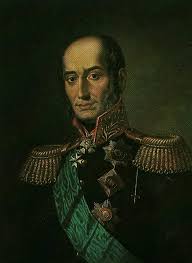General Mikhail Barclay de Tolly. The large-scale military reforms he introduced in the Russian Army prior to the French invasion of 1812 did much to improve the effectiveness of Tsar Alexander’s forces. (George Dawe [1781–1929]/Hermitage, St. Petersburg, Russia)
Also known by his Russian name, Mikhail Bogdanovich Barclay de Tolly, governor-general of Finland, Russia’s minister of war, field marshal, and prince, led Russian armies against Napoleon, gaining great distinction. He was born of a Scottish immigrant family in Livonia, a historic region of Latvia and Estonia on the eastern coast of the Baltic Sea contested by Poland, Sweden, Denmark, and Russia. Educated in Russian military schools, Barclay rose through the ranks of the Russian Army, fighting against the Turks in 1788–1789 and against the Swedes and Poles in 1790 and 1794, respectively. His distinguished service earned him the ranks of colonel in 1798 and then major general in 1799. During the Napoleonic Wars, Barclay led Russian forces at the Battle of Pultusk in December 1806 and at the Battle of Eylau in February 1807, fighting under General Levin Bennigsen, for which he was promoted to lieutenant general. He campaigned against the Swedes in Finland in 1808 and captured the town of Umea in northern Sweden after marching across the Gulf of Bothnia in 1809.
As a reward for his services he was appointed by Tsar Alexander I to serve as governor-general of Finland from June 1809 to February 1810, and he headed the Senate of the government in the autonomous Grand Duchy of Finland. He represented the tsar in Finland and received his instructions from him, allowing Finland to be controlled by Russian interests. Barclay replaced Georg Magnus Sprengtporten, who had served as governor-general from 1 December 1808 to 17 June 1809, for the tsar believed Barclay de Tolly could successfully defend Finland against other European rivals. His successful political administration in Finland led the tsar to appoint him Russia’s minister of war in 1810. He was succeeded in Finland as governor-general by Fabian Steinheil, who governed from 1810 to 1824.
Serving as Russia’s minister of war, Barclay de Tolly oversaw the defense of Russia against Napoleon’s invasion in June 1812, and he continued in this post until the following year. As Napoleon invaded Russia, Barclay de Tolly took to the field once again in command of one of the Russian armies, fighting at Ostrovno and Smolensk. Barclay accepted a military position supporting Field Marshal Mikhail Kutuzov, who commanded the army retreating before Napoleon’s advance. He acted under great stress, since the majority of the senior officers opposed his strategy and the public called for his removal. Barclay distinguished himself at the Battle of Borodino on 7 September and aided in the Russian strategic withdrawal to save the remaining forces. However, he was later forced to leave the army in October 1812. Following the Russian withdrawal from the bloodbath at Borodino, Napoleon was allowed to enter Moscow on 14 September, but Kutuzov’s forces later defeated the French at Maloyaroslavets, and the long retreat from Moscow during the winter of 1812 all but destroyed the Grande Armée.
Barclay de Tolly returned to the army and fought in the 1813 campaign in Germany, receiving the post of commander in chief of the Russian forces following the Battle of Bautzen on 21 May. Bautzen had resulted in a French victory over combined Russian and Prussian forces, and the tsar sought a new military leader in Barclay following Kutuzov’s death on 28 March. It was a great honor for him to have been chosen, since, owing to his Scottish ancestry, he was viewed as a foreigner. He commanded Russian forces at the battles of Dresden (26–27 August), Kulm (29–30 August), and at Leipzig (16–19 October), where the Allies defeated Napoleon and forced him to retreat back to France. He became a count in the wake of the Battle of Leipzig and pursued Napoleon’s army to Paris during the campaign of 1814.
Barclay de Tolly was promoted to the rank of field marshal, and his achievements were publicly acclaimed in Russia. He returned to Russia following the signature of the Treaty of Paris in 1814, but he was called to service once again as commander in chief of Russian forces in 1815 following Napoleon’s escape from Elba. The Russian army was not engaged before Waterloo brought the campaign to an end in June of that year. Following the peace, the tsar bestowed the title of prince on Barclay de Tolly, who then retired to Insterburg.
References and further reading Barclay, Charles Wright. 1924–1934. History of the Barclay Family with Full Pedigree from 1066 to 1933. London: St. Catherine. Barclay, Robert. 1812. Genealogical Account of the Barclays of Urie. London: Herbert. Urie (Barony) Scotland Court. 1892. Court Book of the Barony of Urie in Kincardinshire, 1604–1747. Edinburgh: University Press; printed by Constable. Wimberley, Douglas. 1903. Barclays of Barclay of Grantuly or Garly and Towie Barclay. Aberdeen, Scotland: Barclays.
